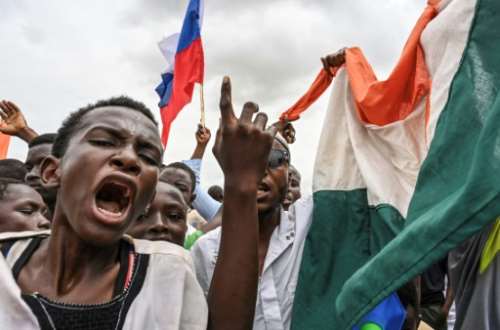In the aftermath of a military coup that saw the removal of Niger’s democratically elected president, the nation is now facing the specter of impending conflict with neighboring countries.
Residents of the capital city, Niamey, are rallying behind calls for mass enlistment of volunteers, rallying to support the military against a looming threat posed by the Economic Community of West African States (ECOWAS).
This regional bloc (ECOWAS), has issued a stern warning, indicating it’s ready to employ military force unless the junta responsible for the coup reinstates ousted President Mohamed Bazoum.
As the junta continues to defy the ultimatum set by ECOWAS, the organization has taken a proactive step by mobilizing a “standby force” to restore stability to the region.
Recall that Niger had stood out as one of the remaining democratic nations within the Sahel region, situated to the south of the Sahara Desert. It held significance as a collaborator for Western nations in their endeavors to counter the escalating jihadi violence affiliated with al-Qaida and the Islamic State group. Countries like France, the previous colonial ruler, and the United States maintain a contingent of around 2,500 military personnel in the area.
These forces engage in activities that involve training Niger’s armed forces and, in France’s case, coordinating joint operations.
Instances of coups have become all too common in this region, and the recent one in Niger has raised concerns globally. However, experts suggest that the more time passes, the less likely an external intervention becomes.
The junta appears to be solidifying its hold on power, potentially compelling the international community to come to terms with the current situation.
A grassroots movement in Niamey is taking the lead in a new initiative aimed at enlisting tens of thousands of volunteers from all corners of the country.
The drive, known as the Volunteers for the Defense of Niger, is designed to offer support in a range of capacities. This includes combat readiness, medical aid, and specialised technical and engineering logistics. A key figure behind this effort, Amsarou Bako, one of the founders, expressed the intention to lend assistance to the junta if required.
“It’s an eventuality. We need to be ready whenever it happens,” he said. The recruitment drive will launch on Saturday in Niamey as well as in cities where invasion forces might enter, such as near the borders with Nigeria and Benin, two countries, which have said they would participate in an intervention. Anyone over 18 can register and the list will be given to the junta to call upon people if needed, said Bako. The junta is not involved, but is aware of the initiative, he said.
As regional tensions continue to escalate, the impasse between Niger and ECOWAS remains unresolved, defying initial indications of peaceful resolution from both parties.
The junta, which had previously rebuffed ECOWAS’ attempts at dialogue, recently conveyed its openness to engage in talks. However, this gesture was quickly followed by the junta charging Bazoum with “high treason” and recalling its ambassador from neighboring Ivory Coast.
Meanwhile, ECOWAS defense chiefs are expected to meet this week, for the first time since the bloc announced the deployment of the “standby” force. It’s unclear when or if the force will invade, but it would probably include several thousand troops and would have devastating consequences, Conflict expert opines
On Tuesday United States Secretary of State Antony Blinken said there was still space for diplomacy to return the country to constitutional rule and said the U.S. supported ECOWAS’ dialogue efforts, including its contingency plans.
The new U.S. ambassador to Niger, Kathleen FitzGibbon, is expected to arrive in Niamey at the end of the week, according to a U.S. official. The United States hasn’t had an ambassador in the country for nearly two years while some Sahel experts say this has left Washington with less access to key players and information.
“The U.S is in a difficult situation with no good choices,” said Michael Shurkin, a senior fellow at the Atlantic Council and director of global programs at 14 North Strategies. “It either sticks to a principled position and pushes for democracy while alienating the junta and risk pushing it into Russia’s arms, or we give up on principle and work with the junta in the hope of salvaging a productive working relationship,” he said.
While regional and western countries scramble for how to respond, many Nigeriens are convinced they’ll soon be invaded.
The specifics regarding Niger’s volunteer force remain unclear, mirroring analogous endeavors in neighboring nations that have yielded varied outcomes. In Burkina Faso, for instance, volunteer fighters were enlisted to assist the military in countering the jihadi insurgency.
However, allegations of atrocities against civilians have surfaced, drawing scrutiny from human rights organizations and local communities.
Bako, one of the heads of the group organizing Nigerien volunteers, said Niger’s situation is different.
“The (volunteers in Burkina Faso), are fighting the Burkinabe who took weapons against their own brothers … The difference with us is our people will fight against an intrusion,” he said.



